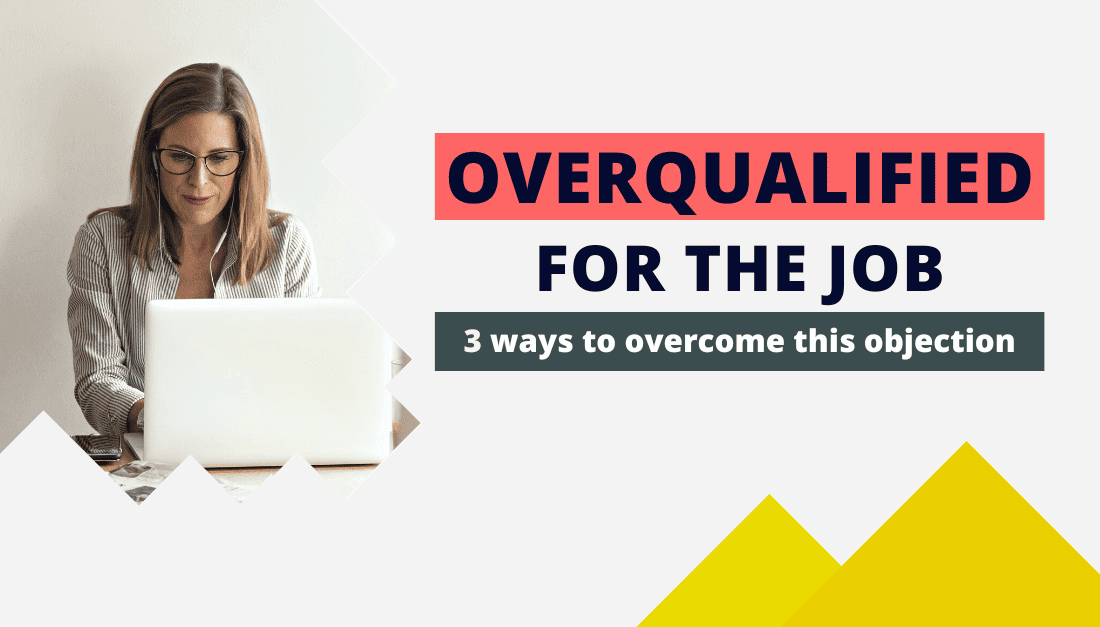
Yes you're overqualified for the job, here's how to win the job anyway
"Sorry, but we feel you’re just overqualified for the job."
If you have 10 or more years of experience under your belt, chances are you're all too familiar with these kinds of rejection emails (and maybe even more creative variations).
After a while, it may feel like your years of hard work and dedication are actually working against you in the job market. In reality, you have a lot to offer as a highly experienced job seeker.
I know that.
You know that.
The problem is how do you get them to see that.
Many older job seekers struggle with conveying their value. Oftentimes this can make their experience a liability rather than an asset.
In this post, I'll show you how to flip that.
I’ll share 3 super common mistakes you may be making that are leading to these rejections. I’ll also give you 3 different ways to overcome the "you're overqualified for a job" objection and turn it into a positive for your job search. Lastly, I’ll give you a few scripts you can use to address their concerns directly.
Alright, let’s jump into the 3 ways to handle the “you’re overqualified” objection.
1. Lean Into Your Expertise Not Your Experience
Let’s be honest, ageism in hiring is very real. But, as we’ve talked about before, there are many ways to overcome ageism.
The number one reason why a candidate might be deemed "overqualified for a job," isn't because of the amount of experience they have. It’s because that’s all they talk about.
“Seasoned professional with 20+ years experience in [insert industry here] and 14+ years experience in [insert role here].”
Does this sound familiar?
So many older job seekers make the mistake of leaning into their experience instead of into their expertise.
If your resume relies heavily on “years of experience,” you may be shooting yourself in the foot.
The best way to turn this around is by making it crystal clear how your years of experience actually benefit the company and this specific position. In other words, lean into your expertise to show them exactly what you bring to the table instead of just reiterating that you have experience.
To do this, you need to highlight your accomplishments and emphasize the impact you've had in your previous roles. Share specific examples of how you've stepped in and quickly made a difference, solving pressing issues and delivering results.
A great way to think about this is by using Claire M. Davis’s 2 magic words.
Here is a short video where Claire, an expert career coach, explains this resume technique:
The better you can tie your experience to the company's current needs, the more confident they'll feel in hiring you.
This starts with crafting impactful bullet points for your resume instead of just listing your job duties. Here is a formula for writing effective resume bullet points:
- Start with a power verb to convey action and impact, such as "developed," "implemented," "achieved", and the like.
- Introduce the method/skill you used to achieve the result, such as "a new design process", "a 360-degree marketing campaign", or "a cost-saving strategy" – you get the idea.
- Communicate the result of your actions in numbers, percentages, or other quantifiable measures, such as "to increase sales by 20%", "to reduce production costs by $10,000", or "to improve customer satisfaction rating from 3.5 to 4.5 stars."

For example, instead of saying, "Managed design teams for over 10 years," try writing something like:
"Led a team of 5 designers in developing a new design process, resulting in a 30% increase in project velocity."
This lets you communicate both your leadership skills and the tangible impact of your work.
If writing isn’t your forte, I highly recommend trying some of the latest AI resume builders. These tools have gotten so good over the last few years and can offer great suggestions for showcasing your achievements.
👉 Here are the top 5 resume builders I’ve used and recommend (all of which are free).
Pro Tip: Once you actually land an interview, it's important not to stop there. The initial screening interview is where most people who are "overqualified" struggle because they end up overwhelming the recruiter with their experience. If that's the case, I recommend watching this video to learn how ace this part of the interview process.
2. Acknowledge Stepping Back
Another concern that some recruiters may have when someone with a leadership background applies for an individual contributor position is whether they'll be comfortable taking a step back in their career. This is especially true if you had previously held high-profile positions within your organization.
If that’s the case, it's important to acknowledge this concern and address it directly in your interviews before they can deem you overqualified.
I recommend talking about why you're looking to move back into an individual contributor role, and how it aligns with your career goals and aspirations.
You want to show that you're not only willing, but that you’re excited about the opportunity to dive deep into a specific area or skill set.
The idea here is to "own your story", as Sonal Bahl advises in this great video where she shares the story of the “Gully Boy.”
By taking full ownership of your narrative and explaining it in a positive light, you take away the power of the recruiter or hiring manager to use it against you.
Don’t give them a chance to come to their own conclusions, which may not always be in your favor. Instead, proactively address their concerns before they can even have them.
This also shows several qualities that many recruiters look for, such as that you're self-aware, confident, and have a clear understanding of your career goals.
Here is an example of what you could say to explain your role change:
"I've always been keen on developing my leadership skills and I've had the opportunity to do so in my previous roles. However, as I reflected on my long-term career goals, I realized that I have a strong passion for hands-on work. That's why I'm excited about this opportunity to step back into an individual contributor role and really immerse myself in this area."
3. Counter “You’ll Be Bored”
Lastly, a recruiter may have doubts about your interest or ability to handle a role that may seem too "junior" for someone with your experience. This is the classic "you'll be bored" argument.
This is a very fair concern as this does happen very often with more senior candidates.
In this scenario, it's your job to showcase your proactive mindset. Bring their attention to the fact that you're focused on making a meaningful impact and contributing to the growth of the company.
But don't make it all talk and no action - be specific about how you can help the company achieve its goals.
For example, if the job you're applying for is "Media Buyer," you could say something like:
"I've managed large media budgets in the past, up to $10 million. In this role, I'm excited about the opportunity to apply my skills and experience at this smaller scale, where I can give more personalized attention to each campaign. I like the idea of growing something from the ground up and I think there’s a great opportunity to do that here."
Just like that, you'll have addressed their concern that you’re overqualified for a job and you’ll have showed enthusiasm for the role. Plus, you’ve shown how you plan to grow within the role, which is a huge plus for them!
Remember, companies aren't just looking for someone who can do the job - they want someone who is passionate and motivated to make a difference.
Pro Tip: Right after addressing their concern, always follow up with an insightful follow up question that redirects the conversation back to them. For example, you could ask, "What learning and development opportunities are there to further develop in this position?"
Takeaways & Next Steps
Remember that when a recruiter interviews anyone, they’re often looking for red flags. Will this person be easy to work with? Will they get bored in the role? Have they dealt with adversity before? Are they overqualified for the job?
Applying for jobs you may be “overqualified” for is no different. You want to address their red flags before they have a chance to think about them.
So, to avoid being deemed overqualified for a job, remember to show your expertise, not just your experience. Make sure you explain why you’re taking a step back. And lastly, explain how you plan to be engaged in the role and how you’ll grow.
If you’d like more help with your job search, you can join our free job search courses by dropping your email below. You’ll get instant access to our job-winning courses and even some tools to help you with your job search.
More from the blog:
How To Ask Why You Didn’t Get the Job (That Will Actually Get a Reply)
How To Ask Why You Didn’t Get the Job (that will actually get a reply) "Thank you for your...
77 LinkedIn Headline Examples That Will (actually) Get You Noticed
77 LinkedIn Headline Examples That Will (actually) Get You Noticed According to a recent JobVite...
7 Creative Job Application Ideas To Get an Employer’s Attention
7 Creative Job Application Ideas To Get an Employer’s Attention If you’ve been applying to jobs...
Like this? Try our free courses!
Tired of sending your job applications into a black hole and never hearing back? Get hired faster with our guided courses all for FREE!
Bogdan Zlatkov is the Founder of GHYC and author of "The Ultimate Guide to Job Hunting", ranked #1 on Google. He has been featured in the Wall Street Journal, Fast Company, HR Dive, and more. At GHYC, Bogdan creates job search courses & tools by working with award-winning career coaches, best-selling authors, and Forbes-Council members. Prior to GHYC, Bogdan led the content programs at LinkedIn Learning.
